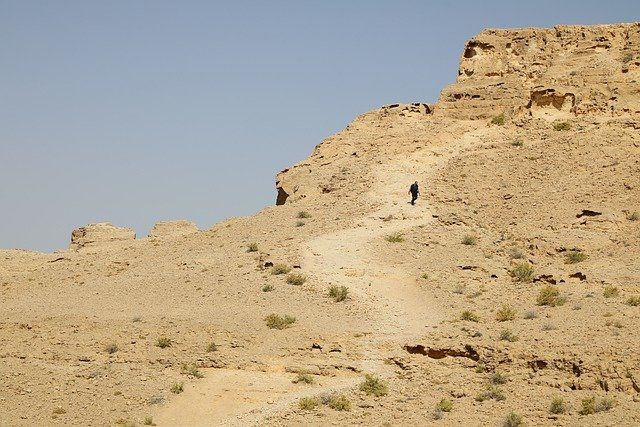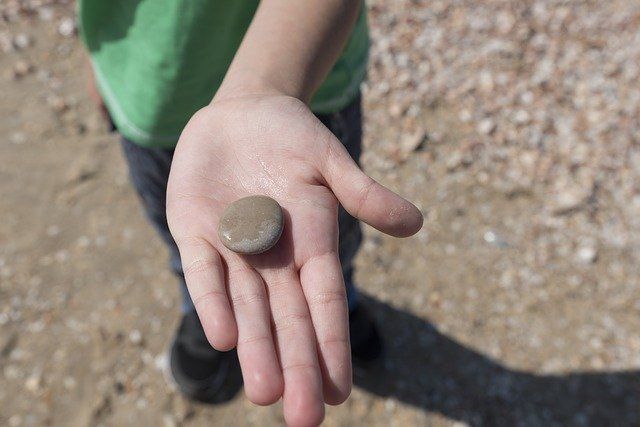He became a national hero overnight. A young shepherd, going about his daily duties, was used by God to overcome a giant! Who can tell when a life-changing day may occur?
David, aged about twenty, had set out at the request of his father to take food to his brothers, who were in the army fighting the Philistines. Perhaps David caught his breath when he saw and heard Goliath, the massive Philistine champion, laughing at God’s chosen people.
He saw a man of three metres, clad in armour weighting fifty-seven kilos, with a enormous spear whose iron point weighed seven kilos. The giant roared out his daily challenge, as he had for the past six weeks: ‘This day I defy the ranks of Israel! Give me a man and let us fight each other’ (1 Samuel 17:4-10).
Saul, though himself a tall man, and king of Israel, shook with fear. So did his son, the daring Jonathan, who had defeated a whole garrison of Philistines. Even his faith failed when he saw the size of Goliath and heard his taunts. No wonder the rest of the Israelites knocked at the knees with fright! (1 Samuel 17:11).
Unbelief
Why would no one take on Goliath? Beneath the Israelites’ fear lay the deeper problem of unbelief. They did not really believe that God could give them the strength to defeat such an opponent.

They behaved liked their forefathers in the wilderness, who saw giants and stopped trusting God (Numbers 13:27-33). Yet forty years later the Jews, under the leadership of Joshua, defeated those same giants and possessed the promised land. Had God changed? Or was his power still the same?
Are we any better than Saul and Israel? We look at the wickedness of our age, consider our own weakness and ineffectiveness, and then too often sink into depression and despair. We ought rather to remind ourselves of the greatness of God and his willingness and purpose to save sinners.
We ought to rejoice that ‘the gospel of Christ … is the power of God for the salvation of everyone who believes’ (Romans 1:16). The gospel that made such an impact in the pagan Roman Empire has not changed in 2000 years!
When we feel discouraged at the state of the nation and the church we should read how God used men such as George White-field and John Wesley to slay giants of great wickedness in the eighteenth century.
Courageous faith
David saw the same giant and heard the same words as everyone else. But he reacted differently, responding with words of faith and deeds of courage.
The Jews saw a giant and imagined him conquering Israel. David saw a sinner mocking God and knew that the Lord would defend his own Name. ‘Who is this uncircumcised Philistine’, he asked, ‘that he should defy the armies of the living God?’ (1 Samuel 17:26). That puts things in a new light!
Goliath laughed at the Jews but he was really laughing at God. Those who laugh at God and his people will one day hear God laughing at them: ‘The One enthroned in heaven laughs; the Lord scoffs at them’ (Psalm 2:4), and they will weep for ever in hell.

However, the God of wrath extends mercy to those who repent. His offer of mercy comes in verse 12 of the same Psalm: ‘Kiss the Son, lest he be angry and you be destroyed in your way’. To ‘Kiss the Son’ is to ask for his pardon, to seek to be reconciled to the holy God through the death of his Son, Jesus Christ (Ephesians 2:16).
David saw Goliath and remembered God’s past help as he defended his sheep from a lion and a bear (1 Samuel 17:34-37). Gordon Keddie comments: ‘Israel was God’s flock, Goliath no more than a particular predator … David stepped forward as the shepherd who would protect his sheep’.
Spiritual warfare
Refusing Saul’s armour and armed only with stones and a sling, David confronted Goliath ‘in the name of the Lord Almighty, the God of the armies of Israel’ (1 Samuel 17:45).
Do we sometimes fight the Lord’s battles with ‘the armour of Saul’? Do we trust human intelligence and strength rather than depending on God’s wisdom and power?
Perhaps we place too much emphasis on our eloquence and our methods, instead of giving ourselves more to prayer. Or maybe we try to browbeat unbelievers into accepting God’s word instead of quietly preaching Christ and praying for him to save their souls. At other times we defend God’s truth with an ungracious attitude and a contentious spirit. David felled Goliath because he believed ‘the battle is the Lord’s’ (1 Samuel 17:47).
The apostle Paul makes the point thus: ‘For though we live in the world, we do not wage war as the world does. The weapons we fight with are not the weapons of the world. On the contrary, they have divine power to demolish strongholds’ (2 Corinthians 10:3-4). Our weapons are Spirit-anointed preaching, zealous gospel outreach, and earnest prayer.

Five stones
Why did David select five stones when he only needed one? He was sure that God would give him success but he did not know how many stones he would use in the process.
God alone could give victory but David had to sling the stone that felled the giant and then cut off his head. The sovereign God does not have to use human instruments, but he chooses to do so, giving us the joy and privilege of service.
We trust God but we still need to use our weapons. To quote Paul again: ‘Be strong in the Lord and in his mighty power … Take the sword of the Spirit, which is the word of God. And pray in the Spirit on all occasions …’ (Ephesians 6:10-18).
God’s power
The outcome of Goliath’s defeat? Jews and Philistines alike discovered ‘that there is a God in Israel’ (1 Samuel 17:46). Let us pray that unbelievers may see God’s power as we overcome the modern giants of unbelief, indifference, doubt and fear.
Behind all these, of course, stands the biggest giant of all, Satan. We fight, despite all difficulties, because we believe the promise: ‘The God of peace will soon crush Satan under your feet’ (Romans 16:20).



